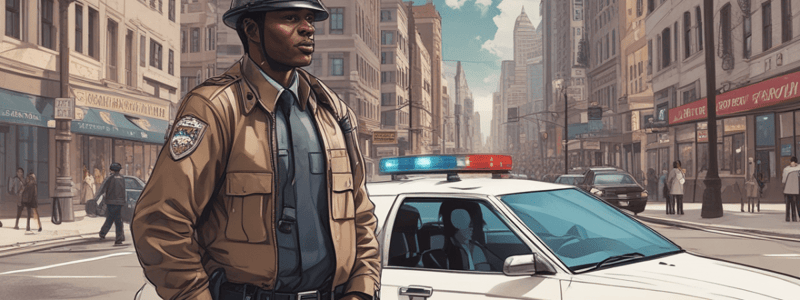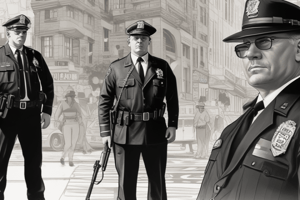Podcast
Questions and Answers
What is one reason why police agencies take steps to remove problem officers?
What is one reason why police agencies take steps to remove problem officers?
- To promote career development and advancement opportunities
- To prevent litigation and potential financial losses (correct)
- To improve community perception of the agency
- To prevent officer-misbehavior from being reported in the media
What happens to an officer's span of contacts as they progress through the ranks?
What happens to an officer's span of contacts as they progress through the ranks?
- It remains the same to maintain consistency
- It decreases to minimize the opportunity for corruption
- It increases, providing a wider opportunity for influence (correct)
- It is terminated to prevent further corruption
Why do police agencies want to prevent corrupt officers from advancing through the ranks?
Why do police agencies want to prevent corrupt officers from advancing through the ranks?
- To prevent intra-departmental dissension
- To prevent the community from perceiving them as corrupt
- To prevent them from tainting more officers or widening their scope of corruption (correct)
- To prevent media coverage of their actions
What is the result of the community perceiving police officers as corrupt?
What is the result of the community perceiving police officers as corrupt?
What is a benefit of studying ethics and professionalism in law enforcement?
What is a benefit of studying ethics and professionalism in law enforcement?
What percentage of police officers today are described as good, upstanding people?
What percentage of police officers today are described as good, upstanding people?
What is the impact of corruption on the majority of officers in a department?
What is the impact of corruption on the majority of officers in a department?
What is the consequence of a corrupt officer's lack of trust in the eyes of the citizens they serve?
What is the consequence of a corrupt officer's lack of trust in the eyes of the citizens they serve?
What is the personal impact on an officer who engages in corruption?
What is the personal impact on an officer who engages in corruption?
What is the definition of ethics?
What is the definition of ethics?
Why is it important for an officer to have personal integrity?
Why is it important for an officer to have personal integrity?
What is the relationship between the media and an officer's ethics?
What is the relationship between the media and an officer's ethics?
What are the six sources of ethics in law enforcement?
What are the six sources of ethics in law enforcement?
What is the purpose of a professional code of ethics?
What is the purpose of a professional code of ethics?
What is the role of social norms in shaping an officer's ethics?
What is the role of social norms in shaping an officer's ethics?
What are the six pillars of character?
What are the six pillars of character?
What is the purpose of considering 'The Candle' ethical choice strategy?
What is the purpose of considering 'The Candle' ethical choice strategy?
What is the purpose of the 'Condemnation of the condemners' rationalization?
What is the purpose of the 'Condemnation of the condemners' rationalization?
What is the 'Purpose' aspect of the 5 P's of ethical power?
What is the 'Purpose' aspect of the 5 P's of ethical power?
What is one method of preventing corruption in an organization?
What is one method of preventing corruption in an organization?
What is the 'Perspective' aspect of the 5 P's of ethical power?
What is the 'Perspective' aspect of the 5 P's of ethical power?
What is the purpose of considering 'The Bell' ethical choice strategy?
What is the purpose of considering 'The Bell' ethical choice strategy?
Which of the following is NOT one of the five standards of ethical policing?
Which of the following is NOT one of the five standards of ethical policing?
What is the main difference between bribery and extortion?
What is the main difference between bribery and extortion?
What is the term for officers who engage in corrupt activities only occasionally?
What is the term for officers who engage in corrupt activities only occasionally?
According to Sherman, what is Type III corruption?
According to Sherman, what is Type III corruption?
What is quid pro quo harassment?
What is quid pro quo harassment?
What is the main issue with gratuities?
What is the main issue with gratuities?
What was the significance of the Tennessee v. Garner case?
What was the significance of the Tennessee v. Garner case?
What is LACT in the context of ethical decision-making?
What is LACT in the context of ethical decision-making?
Who are stakeholders in a situation?
Who are stakeholders in a situation?
What are the three ethics check questions?
What are the three ethics check questions?
Flashcards are hidden until you start studying
Study Notes
Justifications for Attending the Program
- Career Survival: Police agencies are becoming less tolerant of officer misbehavior, and acting inappropriately can lead to litigation and removal of problem officers.
- Career Development: As an officer progresses through the ranks, their span of contacts increases, and a corrupt officer can taint more officers and widen their scope of corruption.
- Media Coverage: The news media watches officers' actions, and missteps can lead to negative community perception and mistrust.
- Community Perception: The community's perception of the police department affects its effectiveness, and corruption can lead to mistrust, disillusionment, and hostility.
- Intra-departmental Dissension: Corruption can lead to morale suffering among good officers and create a divide within the department.
- Officer Survival: Corrupt behavior can result in serious injury or loss of life due to lack of trust and compromised integrity.
- Personal Integrity: Studying ethics and professionalism helps maintain personal integrity and upholds the oath taken as a law enforcement officer.
Definition of Ethics
- Ethics: A code of values that guides choices and actions, determining the purpose and course of life.
- Core Set of Beliefs: Ethics is about what we do, and it sets standards for behavior.
- Values: Ethics involves prioritizing values, and different values can lead to different outcomes.
Sources of Ethics
- Justice: A difficult concept to define, depending on one's point of view, and the law serves to define its limits.
- Law: Used to control individual and government behavior, relying on the ethics of those in government service.
- Agency Policy: Used to specify acceptable limits of officer conduct, defining the agency's values and community expectations.
- Professional Code of Ethics: Used to guide and restrict behavior, determining if an occupation is a profession.
- Social Norms: Developed through socialization, influencing personal values and behavior.
- Personal Values: Prioritizing values, which can conflict with social norms and agency expectations.
Pillars of Character
- Trustworthiness: Honesty, integrity, promise-keeping, and loyalty.
- Respect: Treating others with dignity and respect.
- Responsibility: Accountability, pursuit of excellence, and self-restraint.
- Justice and Fairness: Upholding justice and fairness in all actions.
- Caring: Showing empathy and compassion towards others.
- Civic Virtue and Citizenship: Demonstrating civic responsibility and good citizenship.
Standards of Ethical Policing
- Fair Access: Ensuring equal access to police services and resources.
- Public Trust: Maintaining trust between the police and the community.
- Safety and Security: Prioritizing safety and security for all individuals.
- Teamwork: Collaborating with others to achieve common goals.
- Objectivity: Making decisions based on facts and evidence, rather than personal biases.
Bribery and Extortion
- Bribery: When a citizen offers something of value to influence an officer's performance.
- Extortion: When an officer initiates an agreement, requiring a person to give them something of value in exchange for a performance.
Corrupt Departments
- Type I: Individual officers using their position for personal gain, with no organized effort.
- Type II: Pervasive unorganized corruption, with many officers acting unethically, but not organized.
- Type III: Pervasive organized corruption, with bad officers acting in an organized manner, and the police administration either actively participating or assisting passively.
Sexual Harassment
- Quid Pro Quo: Literally "this for that," where an officer demands something in exchange for a favor.
- Hostile Work Environment: Creating an uncomfortable work environment due to prejudice or discrimination.
Gratuities
- Arguments: Abuse of police authority, expression of appreciation, attempt to corrupt officers, or goodwill.
- Socialization: New officers may feel compelled to accept gratuities to avoid alienation from other officers.
- Regulating Gratuities: Important to set boundaries and guidelines for accepting gratuities.
Tennessee v. Garner
- Case: A young man was shot by an officer while attempting to escape from a burglary scene, leading to a Supreme Court rule.
- Supreme Court Rule: Deadly force can only be used to protect oneself or others, or to prevent escape of someone who poses a great risk to the community.
L.A.C.T.
- Identify Alternatives: Considering different options when faced with an ethical dilemma.
- Project the Consequences: Evaluating the potential outcomes of each alternative.
- Tell Your Story: Preparing to defend one's actions without lying.
Stakeholders
- Definition: Any person, organization, or entity affected by an officer's actions.
- Examples: Community, suspect/defendant, department, family, and police family.
Ethics Check Questions
- Is it Legal?: Ensuring actions are within the bounds of the law.
- Is it Balanced?: Evaluating the potential consequences of each alternative.
- How Will I Feel About Myself?: Considering the personal impact of one's actions.
Ethics Choice Strategies
- The Bell: Considering warning signs or "bells" when evaluating alternatives.
- The Book: Ensuring alternatives do not violate laws, policies, or rules.
- The Candle: Evaluating how actions will stand up to public scrutiny.
Excuses for Unethical Behavior
- Denial of Responsibility: Shifting blame or claiming innocence.
- Denial of Injury: Downplaying the harm caused by one's actions.
- Denial of the Victim: Dehumanizing or justifying harm to others.
- Condemnation of the Condemners: Shifting focus to others' wrongdoing.
- Appeal to "Higher Loyalties": Justifying ethical misconduct by appealing to a higher authority or group loyalty.
The 5 P's of Ethical Power
- Purpose: Understanding one's purpose and the agency's mission.
- Pride: Maintaining self-esteem and a sense of satisfaction.
- Patience: Having a clear purpose and being willing to wait for the right outcome.
- Persistence: Sticking to one's principles, even when it's not convenient.
- Perspective: Reflecting on one's actions and seeking guidance from within.
Preventing Corruption
- Sound Applicant Selection: Ensuring that new officers are of high moral character.
- Reinforcement of Core Values: Emphasizing the importance of ethics and professionalism.
- Active Anti-corruption Programs: Implementing programs to prevent and detect corruption.
Studying That Suits You
Use AI to generate personalized quizzes and flashcards to suit your learning preferences.




